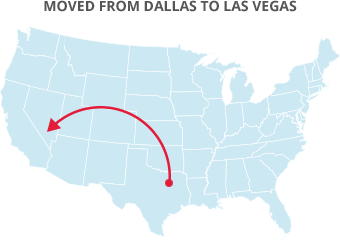

 By Julie DeLong, A-1 Freeman Moving Group
By Julie DeLong, A-1 Freeman Moving Group
Unfortunately, as stressful as moving is for adults, the psychological effects of moving on children may be underestimated. Research shows that moving for children results in various issues for children, depending on age and frequency. Specifically, the MacArthur Foundation found:
However, there are also plenty of ways to not only incorporate the help of your children when moving, but to use this transition as a time of learning and development. Here are some key ways you can help your child(ren) prepare, grow, and change as you make your next move.
Michigan State University reports that simple matching and sorting activities are "early stages of math development." Considering that matching and sorting require thinking and reasoning skills as well as fine motor skills, having your child assist in this creative way can contribute to strong logic and problem-solving skills in the future. A few examples of ways to incorporate this include:
With the advances in technology, it's no secret that today's kids don't always get enough exercise. In fact, the 2018 U.S. Report Card on Physical Activity for Children and Youth (aged 6 - 17) indicates that only 24 percent of American youth "meet the guideline of 60 minutes of physical activity every day," but moving is the perfect opportunity to get them away from the electronics and to be more active! A few ways you can incorporate exercise and motor skills are:
Children are often overloaded with toys, gadgets, and thing-a-majigs that they may have even forgotten they had. This, in turn, can create a sense of disconnect from the things they have. However, when children are given the responsibility of packing their own things, this gives them more responsibility for the things they have and a greater appreciation for them as well. The Center for Parenting Education suggests that responsibility includes components like doing something to the best of one's ability, accepting credit when you do things right and acknowledging mistakes, and being a contributing member of one's family, community and society. What better way to encourage these things than with the packing and moving process?
Naturally, spending time together creates bonds. Since moving is often a stressful time, it can provide an opportunity for you and your child(ren) to work together through the transition. Imagine packing, sorting, and working together as you share thoughts, ideas, and tasks.
While you're bonding through the moving process, this will naturally serve to prepare the child(ren) for the move. Children who are changing schools are especially stressed out so if you're able to connect with them while packing and address their concerns, this will better prepare them for the move. For example:
Life is uncertain. While moving can turn a child's world all topsy-turvy, it also serves to prepare them for the unpredictability of life. As a parent, you can use this experience to help them learn to adapt, grow, and accept the constantly changing world.
And of course, you can help lessen the overall stressors of moving by incorporating the help of a qualified moving company. A-1 Freeman Moving Group is here to assist you in any way we possibly can. Whether you're moving a few blocks away or a few states away, contact us today to find out how we can help your family move more safely and efficiently.
Request a free quote

